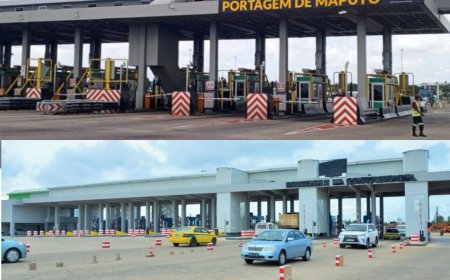"We work like slaves for the Portuguese ": A testimony of mozambicans in Portugal
Promises of employment and prospects for better living conditions are the main attractions that lead to the massive relocation of Mozambicans to Portugal.
Currently, there are Mozambicans living in poverty in Portugal, a European country with just over 10 million inhabitants, a number that tends to decrease due to low birth rates.
The migration of Mozambicans to Portugal is driven, among other factors, by the increasing unemployment rates in Mozambique, with Portugal seen as a gateway to Europe, perceived as a land of opportunities.
Nevertheless, Portugal is one of the poorest countries in Europe, with its GDP per capita, expressed in purchasing power parities, at 78.7% of the European Union average in 2022, placing Portugal 20th among the countries with the highest per capita wealth.
According to the Observatory of Emigration, about 850,000 young people, or 30% of those aged 15 to 39, have left Portugal due to taxes, prompting the Portuguese government to reduce taxes to prevent young people from leaving the country.
The disillusionment of a reality contrasting with expectations
Among the statistics of Mozambicans in Portugal is Jorge Maurício, a 28-year-old Mozambican who has been living in Portugal since the end of 2023.
TORRE.News contacted him, and he explained that he moved to Portugal at the invitation of a friend who had been there since early 2022, to take up a job in the hospitality sector, which he saw as an opportunity to build a life abroad.
"But what I am seeing here is totally different from what I expected. Working in Portugal is not what many think, and I believe few know what really happens here," he said, referring to the precarious living and working conditions he endures.
Working in a restaurant, he said he initially agreed with the employer to work 9 hours a day, from 7 am to 3 pm, but this stopped happening within the first few weeks of work.
"They claim that it is not enough for the hour to arrive, the tasks must be completed first. But the problem is we sometimes leave at 9 pm or even 10 pm," he said.
Maurício lives about 20 kilometers from his workplace. "At least if they provided transport for workers, it would be worth it. But this is only for the bosses and maybe some Portuguese colleagues," he lamented. Another struggle he faces relates to the wages versus current expenses.
"If the salary compensated, we could say it was worth it," he sighed. He earns 860 euros – about 56,000 meticais (exchange rate of the day) – but spends almost half on housing [he rents a room], leaving other expenses like electricity, gas, and transport.
"Sometimes, it feels like we are working just to live and eat. Little is left to send to our families," laments the young man, who has a fiancée and two children in Mozambique, currently living with his mother.
Manuel Domingos, 33, is also disillusioned with immigration to Europe in search of better conditions. He told TORRE.News that he has been in Portugal for over two years, but his life has not seen the progress he envisioned when he decided to leave Mozambique at the invitation of his boss, who owns a construction company.
"The main challenge is the working hours that do not match what we receive and, worse, the expenses we have to make," he complained, without revealing his salary. "I think houses are very expensive, and for those who need to save, it is not easy," he stated.
"Portugal is for the Portuguese, Go back to your countries"
While the wave of people seeking opportunities in Portugal grows, mainly immigrants from Portuguese-speaking countries (CPLP) like Mozambique, Angola, and Brazil, there is concern among Portuguese citizens who do not look favorably upon this influx.
In a video on social media accessed by TORRE.News, a Portuguese man spoke out against immigrants, inviting them to return and invest in their own countries, arguing that "Portugal is for the Portuguese."
"This message is directed to immigrant peoples currently entering Portugal in absolutely copious numbers. We are not your enemies, nor do we feel that you are our enemies. But the pace at which you are entering Portugal and the way you are settling (...) leads us, the Portuguese, to be deeply concerned," he said.
He added, "Understand one thing, Portugal is for the Portuguese and will continue to be for the Portuguese, and most of you come from countries much larger than Portugal [such as Mozambique] and much richer (...) you come from countries with much greater potential than Portugal.
Therefore, we do not understand why you are settling in Portugal." "Go back to your countries, go back to your families, to your women, and invest in your countries, because Portugal is for the Portuguese," he concluded.
Enslaved by being on the margins of the law
The contractual issue is one of the factors that most contributes to the precarious living conditions of Mozambicans in Portugal. Lawyer Victor da Fonseca explained to our reporters that in case of breach of contractual terms, such as increased working hours, citizens can contact labor courts to report the situation.
The problem, according to the lawyer, is that many of these citizens have expired visas and, therefore, cannot resort to justice institutions to expose the injustices they face.
"If, by any chance, these people were in a legal condition in that country, they would have the material and legal means to file a complaint with the overseeing ministry, the labor court, or the Mozambican consulate in Portugal," he considered.
He added that, lacking these requirements, people end up being enslaved by the conditions of staying in the country. Fonseca warned that if a foreign citizen submits a complaint about mistreatment or poor working conditions, the Portuguese state could be sanctioned for violating fundamental worker rights by international institutions such as the International Labour Organization (ILO).
Portugal tightens the grip
From a political perspective, Portugal, which had opened space for obtaining visas for immigrants through an expression of interest (a measure in effect since 2017), has reversed this policy. According to new rules announced last June, only those with an employment contract can obtain a work visa.
This scenario may reflect what some Portuguese parliamentarians, like André Ventura from the CHEGA party, advocate, claiming it could create chaos in Europe, as many immigrants move without minimum housing conditions.
Currently, it is estimated that about 25,000 Mozambicans live in Portugal, in a universe of approximately 800,000 immigrants in the country, a number that has doubled compared to a decade ago.
About 14% of taxpayers are immigrants, contributing over 1.6 billion euros to the economy in 2022. Although immigrants make significant contributions to the Portuguese economy, the Observatory of Immigration admits the possibility of their involvement in precarious work and very low wages.
According to recent statistics from EUobserver, visa rejection requests for Europe generated a total of 130 million euros ($140 million) for European immigration services in 2023, compared to 105 million euros ($113 million) in 2022.






















